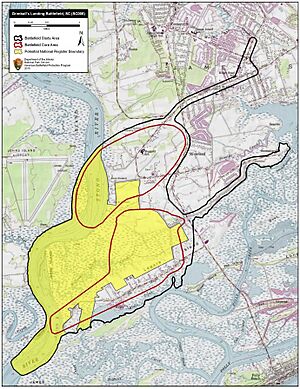Battle of Grimball's Landing facts for kids
Quick facts for kids Battle of Grimball's Landing |
|||||||
|---|---|---|---|---|---|---|---|
| Part of the American Civil War | |||||||
|
|||||||
| Belligerents | |||||||
| Commanders and leaders | |||||||
| Alfred Terry George Balch |
Johnson Hagood | ||||||
| Units involved | |||||||
|
1st Military District, South Carolina | ||||||
| Strength | |||||||
| 3,800 | 3,000 | ||||||
| Casualties and losses | |||||||
| 14 killed 17 wounded 14 prisoners |
3 killed, 12 wounded, 3 missing |
||||||
The Battle of Grimball's Landing happened on July 16, 1863, during the American Civil War. It took place on James Island, near Charleston, South Carolina. This battle was part of a bigger plan by the Union army to attack the defenses around Charleston.
Contents
Who Fought in the Battle?
The Union Army
The United States Army, also known as the Union, fought in this battle. They were led by Brig. Gen. Alfred Terry.
The Confederate Army
The Confederate Army defended the area. Their commander was Johnson Hagood.
What Happened at Grimball's Landing?
The Union army wanted to capture Fort Wagner, a strong Confederate fort. To do this, Union General Quincy Adams Gillmore planned two fake attacks, called "feints." These feints were meant to trick the Confederates. The goal was to make them move their soldiers away from Fort Wagner.
One Union force went up the Stono River. They pretended to threaten a railroad bridge. Another Union force, led by General Terry, landed on James Island on July 8. Terry's troops showed their strength near the Confederate defenses. However, they did not attack right away.
On July 11, General Gillmore launched his main attack on Fort Wagner. The 7th Connecticut Infantry led this assault. It happened at dawn, hidden by a thick morning fog. Despite heavy naval support, the Union soldiers faced strong resistance. They were forced to retreat with many losses. The 7th Connecticut lost 339 men.
Meanwhile, the Confederates decided to attack the Union forces on James Island. On July 16, they tried to surround and destroy part of the Union troops there. The soldiers of the 10th Connecticut Infantry were in a dangerous spot. They were at risk of being cut off.
The Confederates tried to get around them. But the brave soldiers of the 54th Massachusetts Infantry Regiment stopped them. The 54th Massachusetts fought off several attacks. This allowed the 10th Connecticut to safely pull back. The 54th Massachusetts had 43 casualties. This included 14 killed and 17 wounded. But they saved the 10th Connecticut. The next day, the Union forces left James Island.
This battle was very important for the 54th Massachusetts Infantry Regiment. It was their very first fight.
A Soldier's Story
A soldier named First Sergeant Robert John Simmons wrote a letter about this battle. He was from Bermuda and had served in the British Army before. His letter was published in a newspaper. It gave a firsthand account of what happened.
He wrote about being on picket duty, which means guarding an area. His small group of about 250 men was attacked by around 900 Confederate soldiers. He described bullets "raining around us." He saw his friends falling and getting wounded. He wrote about having to fire and retreat.
Sergeant Simmons felt lucky to have survived his "first fiery, leaden trial." He also mentioned his friend, Sergeant Peter Vogelsang, who was shot. Another brave soldier, Sergeant Joseph D. Wilson, was killed after fighting bravely.
This letter shows how dangerous and difficult the battle was for the soldiers.
 | Toni Morrison |
 | Barack Obama |
 | Martin Luther King Jr. |
 | Ralph Bunche |


